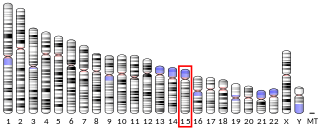The cation channels of sperm also known as Catsper channels or CatSper, are ion channels that are related to the two-pore channels and distantly related to TRP channels. The four members of this family form voltage-gated Ca2+ channels that seem to be specific to sperm. As sperm encounter the more alkaline environment of the female reproductive tract, CatSper channels become activated by the altered ion concentration. These channels are required for proper fertilization. The study of these channels has been slow because they do not traffic to the cell membrane in many heterologous systems.

Kir6.2 is a major subunit of the ATP-sensitive K+ channel, a lipid-gated inward-rectifier potassium ion channel. The gene encoding the channel is called KCNJ11 and mutations in this gene are associated with congenital hyperinsulinism.

Mucolipin-1(ML1) also known as TRPML1 is a protein that in humans is encoded by the MCOLN1 gene. It is a member of the small family of the TRPML channels, a subgroup of the large protein family of TRP ion channels.

Transient receptor potential canonical 1 (TRPC1) is a protein that in humans is encoded by the TRPC1 gene.

The short transient receptor potential channel 4 (TrpC4), also known as Trp-related protein 4, is a protein that in humans is encoded by the TRPC4 gene.

Short transient receptor potential channel 5 (TrpC5) also known as transient receptor protein 5 (TRP-5) is a protein that in humans is encoded by the TRPC5 gene. TrpC5 is subtype of the TRPC family of mammalian transient receptor potential ion channels.

Transient receptor potential cation channel, subfamily M, member 2, also known as TRPM2, is a protein that in humans is encoded by the TRPM2 gene.

Transient receptor potential cation channel, subfamily M, member 7, also known as TRPM7, is a human gene encoding a protein of the same name.

G protein-activated inward rectifier potassium channel 4(GIRK-4) is a protein that in humans is encoded by the KCNJ5 gene and is a type of G protein-gated ion channel.

Potassium inwardly-rectifying channel, subfamily J, member 16 (KCNJ16) is a human gene encoding the Kir5.1 protein.

Cyclic nucleotide gated channel alpha 2, also known as CNGA2, is a human gene encoding an ion channel protein.

Potassium inwardly-rectifying channel, subfamily J, member 14 (KCNJ14), also known as Kir2.4, is a human gene.

G protein-activated inward rectifier potassium channel 3 is a protein that in humans is encoded by the KCNJ9 gene.

Potassium inwardly-rectifying channel, subfamily J, member 13 (KCNJ13) is a human gene encoding the Kir7.1 protein.

Two pore segment channel 1 (TPC1) is a human protein encoded by the TPCN1 gene. The protein encoded by this gene is an ion channel. In contrast to other calcium and sodium channels which have four homologous domains, each containing six transmembrane segments, TPCN1 only contains two domains.

Two pore segment channel 2 (TPC2) is a protein which in humans is encoded by the TPCN2 gene. TPC2 is an ion channel, however, in contrast to other calcium and sodium channels which have four homologous domains, each containing 6 transmembrane segments, TPCN1 only contains two domain.

Mucolipin-3 also known as TRPML3 is a protein that in humans is encoded by the MCOLN3 gene. It is a member of the small family of the TRPML channels, a subgroup of the large protein family of TRP ion channels.

CatSper1, is a protein which in humans is encoded by the CATSPER1 gene. CatSper1 is a member of the cation channels of sperm family of protein. The four proteins in this family together form a Ca2+-permeant ion channel specific essential for the correct function of sperm cells.

CatSper2, is a protein which in humans is encoded by the CATSPER2 gene. CatSper2 is a member of the cation channels of sperm family of protein. The four proteins in this family together form a Ca2+-permeant ion channel specific essential for the correct function of sperm cells.

CatSper4, is a protein which in humans is encoded by the CATSPER4 gene. CatSper1 is a member of the cation channels of sperm family of protein. The four proteins in this family together form a Ca2+-permeant ion channel specific essential for the correct function of sperm cells.
















